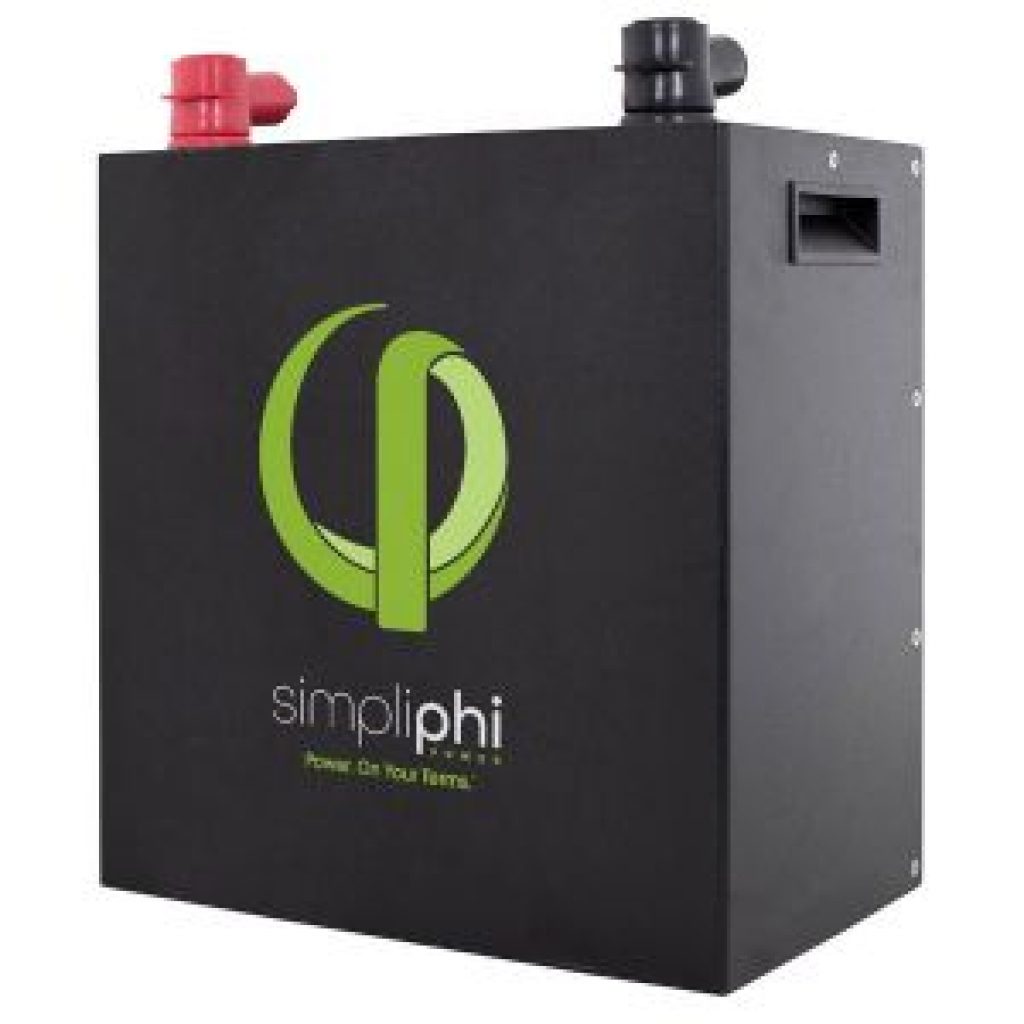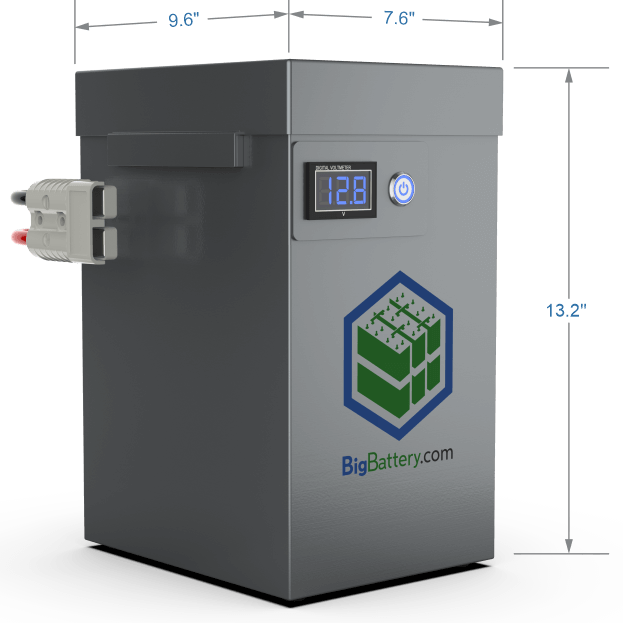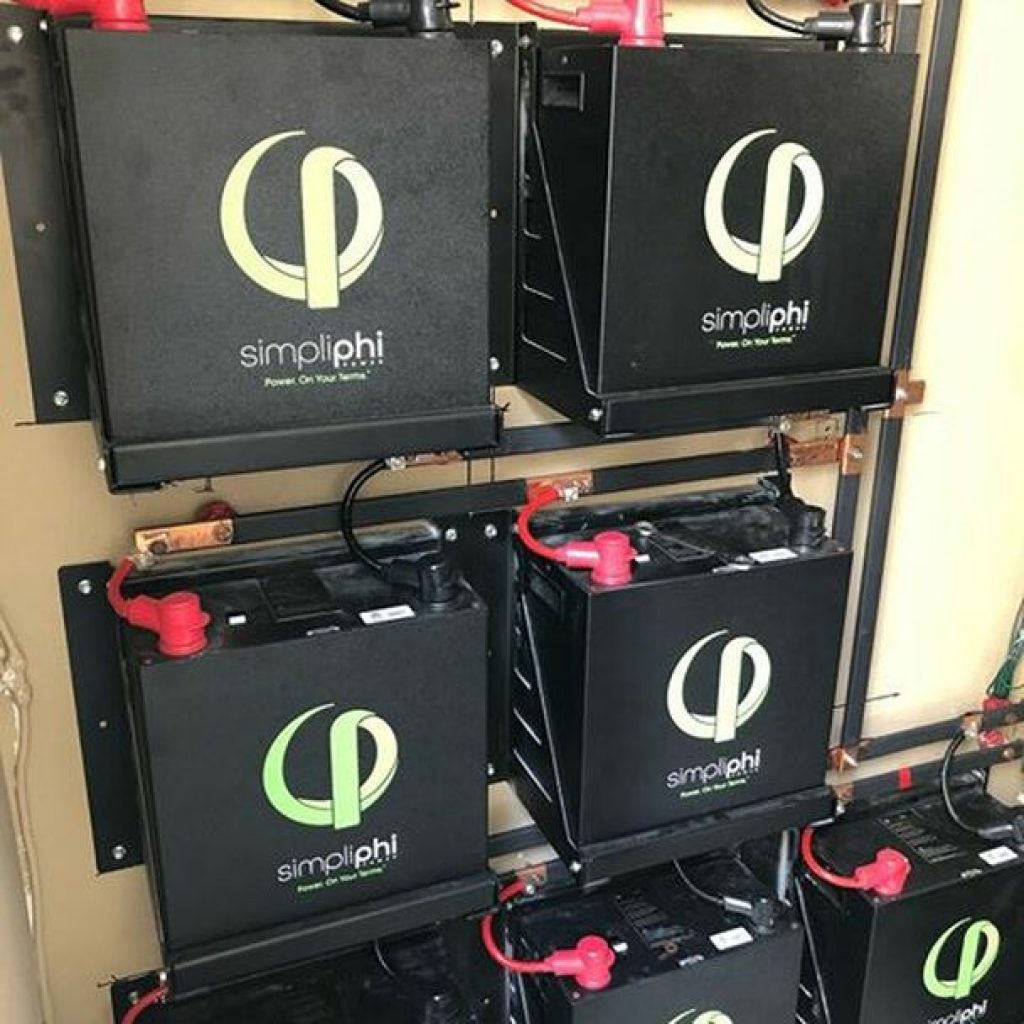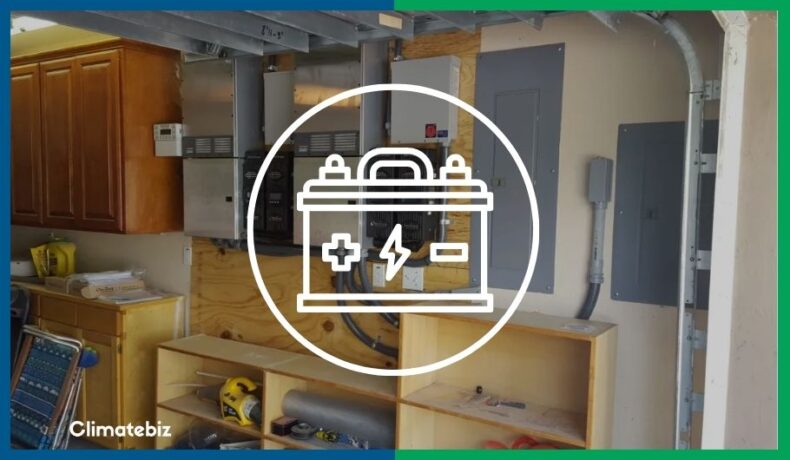Are you looking for the perfect battery size for your needs? A 3 kWh battery might be right up your alley!
Solar batteries have become a crucial part of solar energy systems, particularly residential systems. Why? Because they can store energy generated from sunlight so you can use it later, whether during a power outage or when the sun is no longer shining.
Therefore, having a solar battery is a great way to reduce your reliance on the grid and/or circumvent emergency power situations.
If you’re in the market for a solar battery, you probably already know that batteries come in different sizes, capacities, and chemistries.
The most advanced and efficient solar battery chemistry is the Lithium Iron Phosphate (LiFePO4) battery, although lead-acid batteries (like AGM and Gel) are still widely used.
To size your battery correctly, you’ll need to consider your energy consumption and get a battery that can provide enough energy to meet your needs.
There are several different batteries with different capacities on the market. One of them is the 3 kWh battery. It can store and provide 3000 watt-hours of energy.
3kWh is a good amount of energy for many people, while for others, it might be too little.
In this article, we’ll give you all the information you need about 3 kWh batteries so you can decide for yourself if this battery is right for you.
We’ll cover what these batteries are, how long they last, how much they cost, and how much they weigh. Finally, we’ll answer if a 3 kWh battery is enough to power a house.
Table of Contents
What Is A 3 kWh Battery?
A 3 kWh battery is a rechargeable battery capable of storing (and thus providing) up to 3 kilowatt-hours (kWh) of electrical energy.
You can find 3 kWh batteries of different chemistries. They vary in efficiency, performance, weight, cost, size (dimensions), and durability.
Currently, LiFePO4 is the best battery technology for house batteries. It’s maintenance-free, lightweight, and can last many years (approximately 5000 cycles or 10 to 15 years).

Source: solar-electric.com
Most 3 kWh batteries look like the one above. They come with a clean, simple, and compact design. Installation is easy given their light weight and the fact that they can be wall-mounted or floor-mounted.
Charging A 3 kWh Battery
You can connect it with a solar array to store clean and free solar energy.
Or, if you’re interested in peak shaving to reduce the cost of your electric bill, you can charge your 3kWh battery with AC power from a wall outlet (using the correct size charger).
This way, you can charge your battery during the hours of the day when the price per kWh price is lower and use it when the price per kWh is higher.
By doing so, you can reduce the overall cost of your electricity bill.
However, you should do the math first to figure out if doing that will save you money, given the upfront investment of a battery.
Battery Size
Battery size refers to the battery’s energy capacity, measured in kWh. It can also refer to the battery’s charge capacity, expressed in Ah.
Sizing Your Storage System
To correctly size your solar storage system, you first need to estimate your energy demand.
You can either check the power rating of every appliance you wish to power with the battery or estimate your energy demand by checking your monthly power bill to determine how many kWh you consume in a month. Then, divide this number by 30 to determine your daily energy consumption.
This should give you an idea of how to size your battery system.
Here are some other factors you should consider:
- What do you want to use this battery for?
- Will you need complete power autonomy for a few days?
- Do you want to be prepared for short power outages (that last only a few hours)?
- Do you want your battery to power one or more appliances?
- What is the size of your solar array (if you have one)?
- What about an inverter? If you require one, what size do you need?
By answering these questions, you’ll know how to properly size your solar storage system and figure out if a 3 kWh battery (or maybe a few 3 kWh batteries) suits your energy needs.
Voltage And Amp-Hours Of A 3 kWh Battery
Kilowatt-hours (kWh) are a unit of energy. Therefore, 3 kWh refers to how much energy a battery can store.
However, it doesn’t give you any information on the battery’s voltage, which is an important detail when setting up your solar energy plus storage system.
Energy capacity (Wh) is a product of charge capacity (Ah), and voltage (V):
Energy Capacity (Wh) = Charge capacity (Ah) x Voltage (V)
Therefore, many battery voltage and capacity combinations can result in 3 kWh of energy.
For example, a 48V battery with 65 Ah of capacity would have 3,12 kWh:
Energy Capacity (Wh) = 65 Ah x 48V = 3120 Wh = 3,12 kWh
Similarly, you could have a 24V 130Ah battery and get the same amount of energy:
Energy Capacity (Wh) = 130 Ah x 24V = 3120 Wh = 3,12 kWh
Therefore, a higher battery voltage requires a lower battery capacity (in Ah) to achieve the same energy capacity (kWh). (Battery cells are connected in series to achieve a higher voltage).
And because battery capacity (Ah) is proportional to the amount of active material contained in the battery, a battery with a low charge capacity can weigh less.
In other words, 48V (lithium-based) batteries provide a higher energy density by weight and volume.
For this and other reasons like ohmic losses (voltage drop caused by ohmic losses is proportional to the current density), you’ll usually find high energy (3kWh or more) house batteries of 48V or 24V.
Or course, you’ll still find 12V batteries, like this one from Big Battery:

Source: bigbattery.com
How Long Will A 3 kWh Battery Last?
It depends on your power consumption.
For instance, if you consume 3kW in one hour, your 3 kWh battery will last just one hour. Conversely, if you consume 1kW, your battery will last 3 hours.
Here’s a formula you can use to calculate the running time of your battery:
Running time (h) = battery’s energy capacity (Wh) / power consumption (W)
Considering a 3kW, you can simplify this formula as:
Running time (h) = 3000 Wh / power consumption (W)
To use this formula, you’ll need to calculate your power consumption. You can do this by checking the power ratings of the appliances you wish to power with your battery.
If you consider the average daily consumption of an American home, which is 30 kWh per day, and consider that you only really use energy about 16h a day (except the fridge, which runs 24h a day), then a 3 kWh would last about 1,6 hours.
Example
Let’s say you have a refrigerator that requires 180 watts to work properly and that you want to use your 3kWh to power this refrigerator exclusively. In this case, let’s calculate how long your battery would last:
Running time (h) = 3000 Wh / 180 (W) = 16,67 h
Now, if you want to power several appliances, you need to use the total power consumption, which is the sum of the power ratings of each appliance, like so:
- Refrigerator: common power rating is 180 W
- TV: 80 W
- Laptop Charger: 40 W
Total power consumption: 180 W + 80 W + 40 W = 300 W
Therefore, this battery would last:
Running time (h) = 3000 Wh / 300 (W) = 10 hours
How Much Does A 3 kWh Battery Cost?
It varies according to the battery’s chemistry; most 3 kWh batteries are lithium-based.
Price also depends on the brand, manufacturing location, design, casing, resistance, cycle life, etc.
With enough research, you’ll find good quality 3 kWh batteries between $1200 to $2900.
Because of the relatively high upfront investment, make sure it will be worth it. Purchase a good quality battery and maintain it correctly so that it lasts for as long as possible.
Here’s a table with examples of 3 kWh batteries and their average prices:
| Brand | Model | Chemistry | Price (USD) |
|---|---|---|---|
| Simpliphi | PHI-3.8-48-60 | LiFePO4 | $2690 |
| Simpliphi | PHI3.8 24V 60 VTE BRK | LiFePO4 | $2495 |
| Ampere Time | Ampere Time 12V 300Ah | LiFePO4 | $1110 |
| Power Quenn | B09FT115W2 | LiFePO4 | $1100 |
| Quantum | Q-LFP24100 | LiFePO4 | $1250 |
| Big Battery | FMULE-24030-G1 | LiFePO4 | $1390 |
| Big Battery | F-OWL-12030-G2 | LiFePO4 | $1440 |
| Generac | 0582-5409 | Li-NMC | $1980 |
These prices might seem a bit high, but given that a 3 kWh battery can last for up to 10 years, it’s considered a worthwhile investment.
How Much Does A 3 kWh Battery Weigh?
3 kWh batteries for homes typically weigh between 60 and 120 pounds. The weight of the battery will vary depending on the manufacturer and the specific model/type of battery.
As previously mentioned, most 3 kWh batteries are currently lithium-based, in particular the LiFePO4 chemistry.
The specific energy (amount of energy per kilogram) of LiFePO4 batteries is around 90 to 160 Wh/kg, meaning that a 3 kWh battery (3000 Wh) should weigh between 20 kg (68 lbs) and 35 kg (121 lbs).
That’s a significant weight to lug around, so it’s no wonder why many people choose to install them in their garage or basement.
Here’s a table illustrating examples of 3 kWh batteries and their respective weight:
| Brand | Model | Chemistry | Weight |
|---|---|---|---|
| Simpliphi | PHI-3.8-48-60 | LiFePO4 | 86 lbs / 39 kg |
| Simpliphi | PHI3.8 24V 60 VTE BRK | LiFePO4 | 86 lbs / 39 kg |
| Ampere Time | Ampere Time 12V 300Ah | LiFePO4 | 63 lbs / 29 kg |
| Power Quenn | B09FT115W2 | LiFePO4 | 69 lbs / 31 kg |
| Quantum | Q-LFP24100 | LiFePO4 | 62 lbs / 28 kg |
| Big Battery | FMULE-24030-G1 | LiFePO4 | 88 lbs / 40 kg |
| Big Battery | F-OWL-12030-G2 | LiFePO4 | 50 lbs / 23 kg |
| Generac | 0582-5409 | Li-NMC | 55 lbs / 25 kg |
3 kWh batteries are generally considered medium-sized batteries; they’re often used in homes with moderate energy demand.
These batteries typically have a lifespan of 10 to 15 years, and they can provide a steady supply of power during blackouts or other emergencies.
Is A 3 kWh Battery Enough To Power A House?
Unfortunately not. Well, at least not for long.
According to the EIA (Energy Information Administration), in 2020, the average monthly electricity consumption for a U.S. residential utility customer was 893 kilowatt-hours (kWh). That’s about 30 kWh a day.
If you consider the average energy consumption of a U.S. home, a 3kWh battery will provide only 10% of the average daily consumption. That means it would only last a couple of hours.
However, electricity use in homes varies across regions of the United States and housing types. So it’s all about perspective.
For instance, if you live in a big house with many appliances and wish to power your whole home during a power outage, you’ll need much more than 3kWh.
On the other hand, if you live in a tiny house with few appliances and want to have enough power for your essentials during a power outage, then 3 kWh will be more than sufficient
Therefore, knowing your daily energy consumption is key to understanding if a 3kWh battery can power your house.
Summary
3 kWh may not sound like a lot, but it can be enough to power a small home for a day, depending on your demand. So, if the power goes out, you’ll still have lights, television, and heat for a few hours.
3 kWh is usually enough to charge a laptop about 20 times or charge a cell phone about 80 times. In other words, a 3 kWh battery is exceptionally versatile.
So, if you’re looking for a small emergency power source, a 3 kWh battery is worth considering. However, if you’re looking to have power autonomy for at least 2 days while powering several appliances (non-essential included), a 3 kWh battery is not a worthwhile investment.
Expandable Systems
If you need a more extensive system, consider looking into expandable systems — systems comprising multiple interconnected batteries.

Source: mrsolar.com
When you connect batteries in parallel, you add the amp hour ratings of the batteries, but the system’s voltage remains the same as the batteries’ voltage. Therefore, you can build a storage system with a higher capacity.
Final Thoughts
A 3 kWh battery is an excellent option for an affordable and lightweight storage solution.
This battery can be used in several applications but is usually recommended for residential purposes.
As you saw, a 3 kWh battery may be enough to power a small house, depending on the wattage of the appliances. However, it’s not enough to power an entire home for long under normal circumstances.
So if you’re looking for complete power autonomy for at least a couple of days, you’ll need a more extensive solar storage system; you can achieve this by connecting multiple 3 kWh batteries.
If, after reading this article, you think that a 3 kWh battery isn’t enough to meet your needs, check out our 5 kWh battery article.

